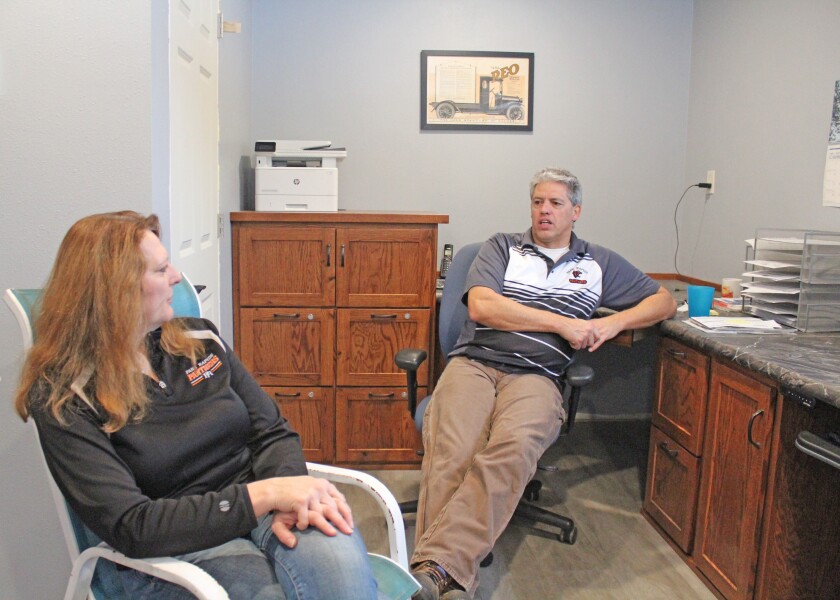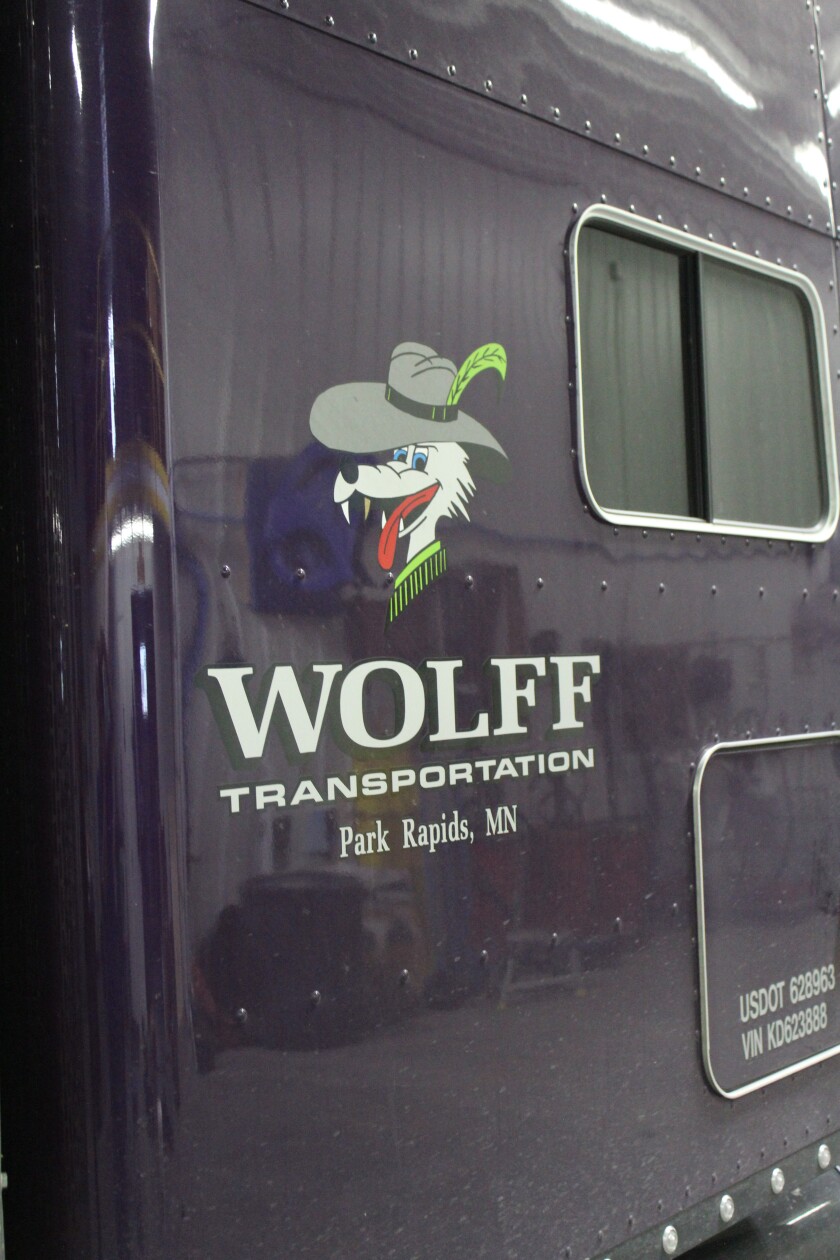The owners of a transport company say changes the COVID-19 pandemic brought to the trucking business are here to stay, and that may be a good thing.
David and Sharon Wolff started Wolff Transportation 20 years ago, initially to allow David to be his own boss while Sharon took care of the financial side of the business.
Having driven trucks since 1989, he said, “I was feeling like I could probably do a slightly better job for myself.”
Today, they own two trucks and seven 53-foot trailers, with one employee and four owner-operators driving for them.
David said the early stage of the pandemic was nerve-wracking, with the first outbreak happening in the Kent, Washington area, close to where their trucks loaded every Saturday.
ADVERTISEMENT
“There was a lot of staying in the truck,” said Sharon. “I think the hardest part was when the rest areas closed.”
For a short period, David explained, rest areas in North Dakota closed at night. While truck drivers could still park there, they couldn’t get into the buildings to use the restrooms, possibly because the state couldn’t find people to keep them sanitized.
Around that same time, restaurants closed to dine-in customers, and tractor-trailers don’t fit under drive-throughs, so it was also hard for drivers to find places to eat.
“There was a couple truck stops being accommodating,” said David. “You could call and they would prepare your food and bring it out to you.”
But after three or four months, the panic eased a bit. “That was a blip on the radar, not that big a deal,” he said. “But there were a lot of people who were nervous about things in those days.”
Some of that nervousness led to changes that have stuck.
“We used to go to warehouses and a lot of times we’d unload our own freight, or you would talk to people face to face,” said David. “Then it got to the point where you would just back in, and you would call them and tell them you were there, and you’d leave your bills in the back of the trailer.”
“There wasn’t a lot of personal contact,” said Sharon.
ADVERTISEMENT
Some of these changes to accommodate COVID-19 worked out for the better, David said. “I think, in our business, things will probably stay permanent like they are. There’s less contact at the warehouses, which is good and bad. … We just back into a door and they unload our freight and we leave. Some places now, we’re not even signing any bills.”
“They’re sending the bills directly to the companies we’re hauling for,” said Sharon. “We just verify it. ‘Did you get the bills?’ And then we’re out of there.”
David said this started because there was concern about COVID spreading through contact with paper. Though this is no longer an issue, they’ve found this new procedure works well.
“It used to be,” Sharon said, “you had to go in and be responsible for the count of the product.”
“Yeah, we don’t do that anymore,” said David.

Turning business away
Starting out, Wolff Transportation hauled specialized food as LTL (less than truckload) freight – meaning they would load up and deliver to anywhere from five to 13 places.
ADVERTISEMENT
“We quit doing that about four years ago,” said David. “Now we mostly haul just truckload freight – one pick, one drop.”
They specialize in temperature-controlled freight – refrigerated and frozen food – and mostly haul Lamb Weston frozen potato products to the northwest.
After dropping a load of french fries in Idaho, of all places, they typically stop in Washington and come home with other frozen foods such as meat, fish and juice concentrates, to deliver to customers in the Twin Cities area.
These regular trips out west don’t rule out other jobs, such as David’s recent trip to Kansas City. For the last 10 years, however, he hasn’t driven full-time, kept busy with dispatching and maintenance on the trucks and trailers.
Even when all their drivers are out on the road, their office phone often rings with haul requests..
“I say ‘We don’t have anybody available’ probably nine times a day, at least,” said Sharon.
“Yeah, we turn down way more freight than we haul,” said David. “We could probably run 10-12 trucks quite easily, and keep them busy.”
Employee shortage
Those phone calls show there is an unmet need in today’s marketplace. David said he thinks it isn’t so much about a driver shortage as other economic factors. .
ADVERTISEMENT
“Truck stops are crowded all the time,” he said. “So, there’s still plenty of trucks out there. I think there’s more freight to haul right now.”
David said he’s heard about driver shortages for the past 30 years. “That’s a little ridiculous,” he said. “If there was a real shortage, it would have been corrected by now.”
Based on conversations with others in the business, David said, he thinks at times the perceived driver shortage was really a wage shortage. But that hasn’t been the case for quite a while.
“When I first started in the trucking biz 32 years ago,” he said, “if you wanted a blue collar job, everything else didn’t pay very well. Trucking, at the time, for a blue collar profession, was a great paying job. Then things kinda caught up.
“I know guys that are OK with driving truck, but they’d rather be home every night, so they’d rather work in a warehouse or construction, things like that.”
Now, he says, things have returned to where trucking pays better than those other jobs. “But maybe people don’t recognize that, or they’re happy doing what they’re doing,” he said.
Sharon’s theory is that there’s an employee shortage across the board, evidenced by all the signs hanging in shop windows, saying “Hiring!”
“My theory,” she said, “is that when COVID hit, people weren’t working because businesses were shut down. Everybody used their inventory. Now, they don’t have backup inventory. So, it’s causing there to be a lot of stuff that’s backed up.”
ADVERTISEMENT
David agreed this could be part of the problem with the container ships lined up at seaports due to the high demand for imported goods. But because his company hauls mostly U.S.-grown food, it isn’t a problem they’ve had to deal with.

Happy to see you
Another current issue is drivers being held up at loading docks for up to six hours due to warehouses being understaffed.
“I can think of several warehouses that probably should have 30-40 people working there, and they’ve got maybe 15,” said David. “That happens a lot.”
He asked people at a warehouse in Washington what was going on, “and it’s like, people just aren’t showing up for work,” said David. “It wasn’t even a COVID thing; they just weren’t showing up. … It’s hard for me to fathom just not showing up for work.”
He said this mostly happens to them only once at a warehouse. “We just won’t go there again,” he said. “We’ll just tell our customers, ‘Sorry.’”
It’s good to have the luxury to be able to do that, he said, though it wasn’t always the case.
ADVERTISEMENT
“There are some places that say, ‘We’ll pay you a lot of money to go there.’ I’ll tell them, ‘OK, sure.’ (But) our general policy is, we try to go to only places that are happy to see us.”
Part of that philosophy is driven by wanting to keep their drivers happy. Nobody wants to be stuck at a loading dock for six hours.
“Like I’ve told some of our customers in the past, you can ask me to haul this freight, but it isn’t to my drivers’ liking, consistently, and they quit, your freight’s not gonna get hauled anyway,” said David. “Not saying that there isn’t work that we have to get done. It’s still work.”
But he added, “We might as well make it as enjoyable as possible.”
After all these years, the couple still loves what they do – and it doesn’t hurt that the money is good.
“We have pride in it,” said David, “and I feel like we feed people. Granted, a lot of it is McDonald’s french fries, but you know.”









